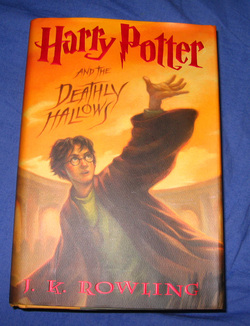
Well it is, but it's not really, just trust me. It's the lead in to my topic, honest.
*WARNING: To anyone who hasn't read/seen the whole series yet (don't laugh, they exist) this does contain spoilers!*
By now we've all heard J.K. Rowling talk about how she feels Harry and Hermione should have been paired together instead of Hermione and Ron. Since then, there's been a back-and-forth backlash about it. Some feel she's right. Others are crying foul for "messing with their childhood". After all, that's how the story went. Regardless of how we WANTED it to go, that's how things happened with-in the tale. Yet it's amazing how instantly polarizing this whole thing is. But I've got one better. There are dozens of big name authors who would make similar admissions about their works.
Now Rowling talks about putting Hermione and Ron together because that was the original plan and she wanted to stick with it. I'm unsure if that means she wanted to change that plan while writing it or not, but even if she did, it highlights something about writing I think gets lost sometimes.
The story has a life of it's own. I've talked about this before. Can we writers still make it go one way or another? Of course. Not always the best idea, but we can. However, after it's all said and done, and the book is on the shelf, writers are always working. I haven't met an author yet that hasn't mentioned he or she would have done something differently in one of their now published works.
This can lead to a lot of sleepless nights. For the veteran, it might lead to thoughts about what would have been had they thought of that years ago. For the novice, they try that much harder and wait that much longer to take the next step. "What if I missed something?" they'll ask. Fact is, they will. They'll look back and think "wow, should have done that differently.
So where dose that leave the reader? If they hear nothing about it, nothing changes. But when they do, it makes them re-think it. They see that world through the new perspective. Personally I'm not sure why that's a bad thing. In the case of Harry Potter, think on this; Maybe Hermione and Harry did have a thing for each other, but somewhere along the way, something happened and it just never got anywhere. Perhaps Hermione secretly thought they'd end up together. Or maybe Hermione took herself out of the running early because she didn't feel she could measure up to, or handle on a constant basis, the hype of "Harry Potter, the boy who lived."
I can already hear the out-cry. The screams of how ridiculous those ideas are (that last one drawing an instant rebuttal from my mom), and I'm not sure I blame you. The good books give us a world so real we feel we've lived -scratch that- are living in it. But once the anger fades, why not let it build the world that much more? Think about it. You're there, in class with Ron, Harry, and Hermione. You're traveling with them, facing the same dangers, and seeing the same signs. What would you have done? Would you have nudged Hermione and Harry together? Would you have scoffed at the idea of her hooking up with Ron, only to be shocked when they announced their engagement?
Would you have done the same thing before you heard Rowling's admission?
That last one is the sticky one. We writers are always second guessing ourselves and always will. Perhaps we should keep our "woops, that's wrong" moments to ourselves for the sake of the reader. Then again, perhaps it's best we share the mistakes we think we made so that we may share our real selves with the reader.
That's a hard line to walk, and I doubt many readers would be entirely sure which way they'd want it.
 RSS Feed
RSS Feed
